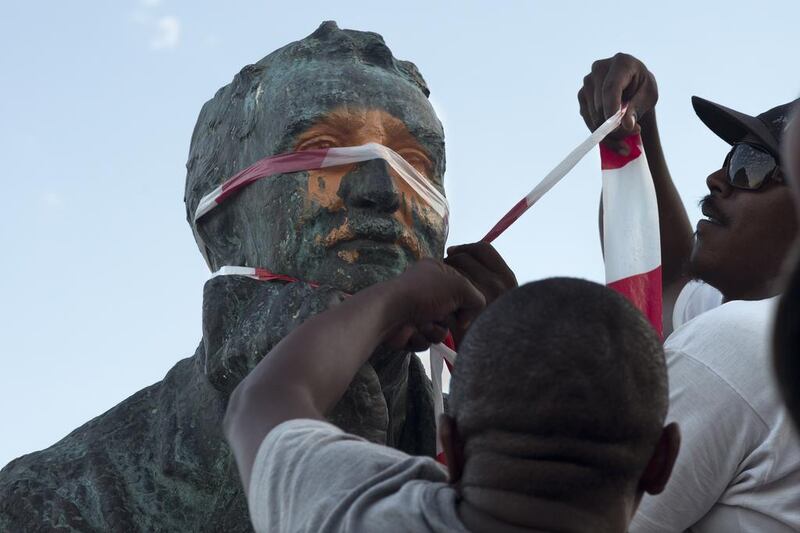If it is true, as George Santayana famously said, that “those who cannot remember the past are condemned to repeat it”, does that remain the case if you excise that past from the history books?
Protesters at a growing number of universities are demanding the removal of almost all traces of prominent figures whose names are now deemed to be inappropriate or even offensive. At Princeton, there have been calls for the Woodrow Wilson School of Government to be renamed, and a mural of the First World War American president removed from a dining room. I had always associated Wilson with his pledge “to make the world safe for democracy” and for founding the League of Nations. It turns out he was also an unreconstructed racist who reversed much of the progress African Americans had made after the Civil War – hence the insistence on his being declared persona non grata.
At Amherst College in Massachusetts, students want to stop their athletes being referred to as the “Lord Jeffs”, after Lord (Jeffrey) Amherst – a one time British governor-general of North America who also gained infamy for his plan to kill native Americans with smallpox.
In both Cape Town, South Africa, and Oxford in the UK, students have called for statues of Cecil Rhodes, the British imperialist and prime minister of the Cape Colony, to be removed. Rhodes’s money has gone into funding many academic institutions – not least the Rhodes Scholars programme, whose alumni include former Australian premier Bob Hawke and US president Bill Clinton. But the protesters are not mischaracterising his attitude towards race relations when they accuse him of being “an architect of apartheid in South Africa”.
In all these cases there is validity to objections to these men being accorded iconic status. Attempting to erase history, however, which would appear to be the logical endpoint of campaigns to remove them from the public sphere, is both wrong-headed and counterproductive. For we need more history, not less.
We should be made aware of the truth about illustrious benefactors or alumni. I can thank the Princeton protesters for illuminating me about Wilson. Their next step should perhaps be to ask the White House to amend its online biography of Wilson, which describes him as “a leader of the Progressive Movement” who prohibited child labour and enacted legislation to protect workers.
There is nothing about his being a man who, as The New York Times put it this week, turned "the federal government itself into an instrument of white supremacy for decades to come" – as surely there should be.
Removing Wilson’s entry altogether, on the other hand, would only serve to diminish Americans’ knowledge of a past that has shaped their present.
Every generation of historians will uncover new research and provide different narratives of history. When one reading is superseded, that does not mean it should be displaced. The older one is still a record of the people of that time – however much we, with hindsight, may lament their lack of enlightenment.
I sincerely hope, for instance, that no child is still taught that Columbus “discovered” America in 1492. Clearly its existence was no revelation to the people already living there, and the idea that it was a “New World” now seems preposterously Eurocentric. Schools should continue to inform pupils that Columbus’s voyage was viewed that way until very recently, however, as it goes some way to explaining the mindset that underpinned colonialism.
Being clear-eyed that others do see history in a different way than us is crucial to international relations, too. How could anyone possibly understand Turkey’s president, Recep Tayyip Erdogan, or Russia’s Vladimir Putin without acknowledging their deep attachment to their countries’ past glories?
There are those who think both are wrong. But attempting to delegitimise or erase their versions of history does nothing to lessen their attachment to them. Their truth is the one with which the rest of the world must engage.
Further, ignorance is dangerous. In 2001, Osama bin Laden put out a video talking of the “humiliation and disgrace” suffered by Muslims for “more than 80 years”. As the historian Bernard Lewis wrote afterwards: “Most American – and, no doubt, European – observers of the Middle Eastern scene began an anxious search for something that had happened ‘more than 80 years ago’, and came up with various answers.”
Why was it not immediately obvious that this referred to the defeat of the Ottoman Empire and the subsequent abolition of both the sultanate and the caliphate? Because westerners preferred the narrative that praised Kemal Ataturk’s secular nationalism, while those who mourned the death of “the sick man of Europe”, as the Ottoman state was nicknamed, were airbrushed from history.
Lewis wrote about bin Laden’s historical allusions in 1998, and warned: “In devising strategies to fight the terrorists, it would surely be useful to understand the forces that drive them.”
Prophetic words, and proof that history matters. Lewis is now 99, but remains a professor emeritus at Princeton. If only the current generation of students could benefit from his advice. I doubt that he, with a lifetime’s trove of scholarship on the past, would consign Woodrow Wilson, or any other historical figure, to the bin. Nor should the protesters.
Sholto Byrnes is a senior fellow at the Institute of Strategic and International Studies, Malaysia





